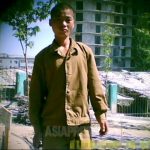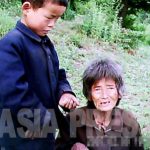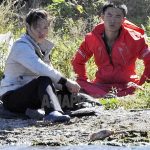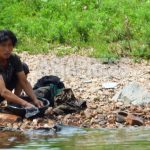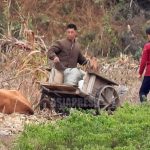2013/September/14
Written by KANG Ji-won, a defector reporter
It has been discovered, through our reporting partner inside North Korea, that the North Korean state is currently compelling people to undertake self-criticism and submit 'a composition of reflection' to express loyalty to the leadership. This self-criticism is demanded of all citizens as a review of their loyalty to the Leader and the Korean Workers' Party.
Our North Korean partner, a resident of Hoeryong city, North Hamkyung Province, gave us the following information via phone conversation, in early September:
"In regards to the revision of the Ten Great Principles, the authorities are compelling all residents, except students engaged in compulsory education, to write a composition of reflection. It should describe four articles - 'reverence activities', 'organized life', 'governance based on instructions of the late Supreme Leaders', 'revolutionalization of family' and be penned by means of a review of ones own life and daily activities."
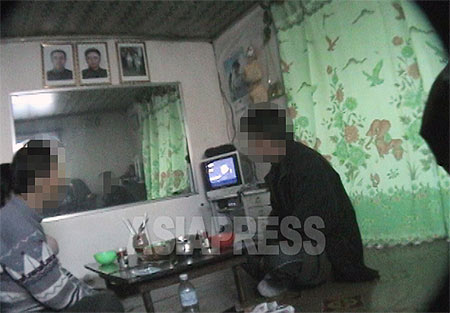
'Revision of the Ten Great Principles' is another way of expressing the revision of the 'Ten Great Principles for the Establishment of monolithic Ideology of the Party', renewed in June - July this year, for the first time in 39 years. In North Korea, the Ten Great Principles is positioned as the supreme commandment to the people, trumping even the constitution and bylaws of the Party. The Principles were created as part of the absolutization of Kim Il-sung's thoughts, and embodiment of the absolute dictatorship of Kim Il-sung and Kim Jong-il.
After the revision, the Ten Great Principles was renamed as 'the Ten Great Principles for the establishment of mono-leadership system of the Party'. In the new principles, the late Supreme Leaders, Kim Il-sung and Kim Jong-il, are equally deified, and Kim Jong-un is prescribed as the only deputy of the late Leaders ascending to the position of supreme leadership.
Amongst the four articles of 'a composition of reflection', the 'reverence activities' prescribe the protection and maintenance of portraits and historical sites of the late Leaders. 'Organized life' describes the degree of participation expected of a person in Party activities and neighborhood administrative organs. 'Governance based on instructions of the late Supreme Leaders' is a self-confession of every persons enthusiastic practice of the words from Kim Il-sung and Kim Jong-il.
'Revolutionalization of the family' calls for a review of family life in order to assess how Party instructions and thoughts are adopted. It is also required of each person the supervision of their own family members to keep at bay what the state considers to be negative influences, such as foreign dramas and smuggled DVDs.
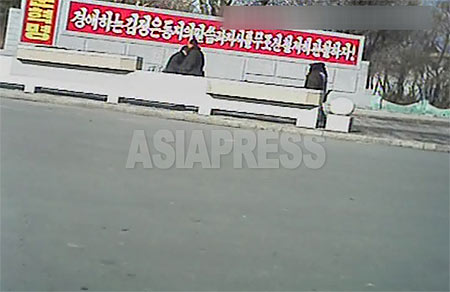
In North Korea, all citizens are ta sked to follow and execute state policy through the Party organs, from the top to the local units, without any delay. The composition of reflection is presumed to be a way for the citizens to familiarize themselves with Kim Jong-un's absolute dictatorship and focus again on their allegiances to the state.
However, people's reactions appear lukewarm to this new imperative. Our reporting partner explained that regular people in North Korea are too busy finding a way to earn a living in a time of economical hardship, and many of them are simply copying the model compositions written by others and submitting it to the authorities. When the authorities come across their plagiarized documents, they order the guilty party to rewrite the composition.
--------------------------------------------------------------------------------------------------
[NOTE] "The Ten Great Principles for the Establishment of the Exclusive Ideology of the Party" are the highest commandments in North Korea, first codified by Kim Yong-ju in 1967, after a purge of various factions inside North Korean politics led to the establishment of absolute authoritarian rule by his elder brother, 'Great Leader' Kim Il-sung. These principles were reformulated by Kim Jong-il in April 1974. It is the Ten Commandments that enforce unconditional loyalty to and worship of Kim Il-sung. People seen as having violated the Ten Great Principles are harshly rebuked and, in some cases, sentenced as having committing a political crime.
--------------------------------------------------------------------------------------------------
*** Rimjin-gang
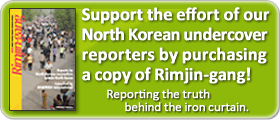
* Editor's notes on North Korean reporters
ALL REPORTS >>>
ARCHIVE(pdf) >>
